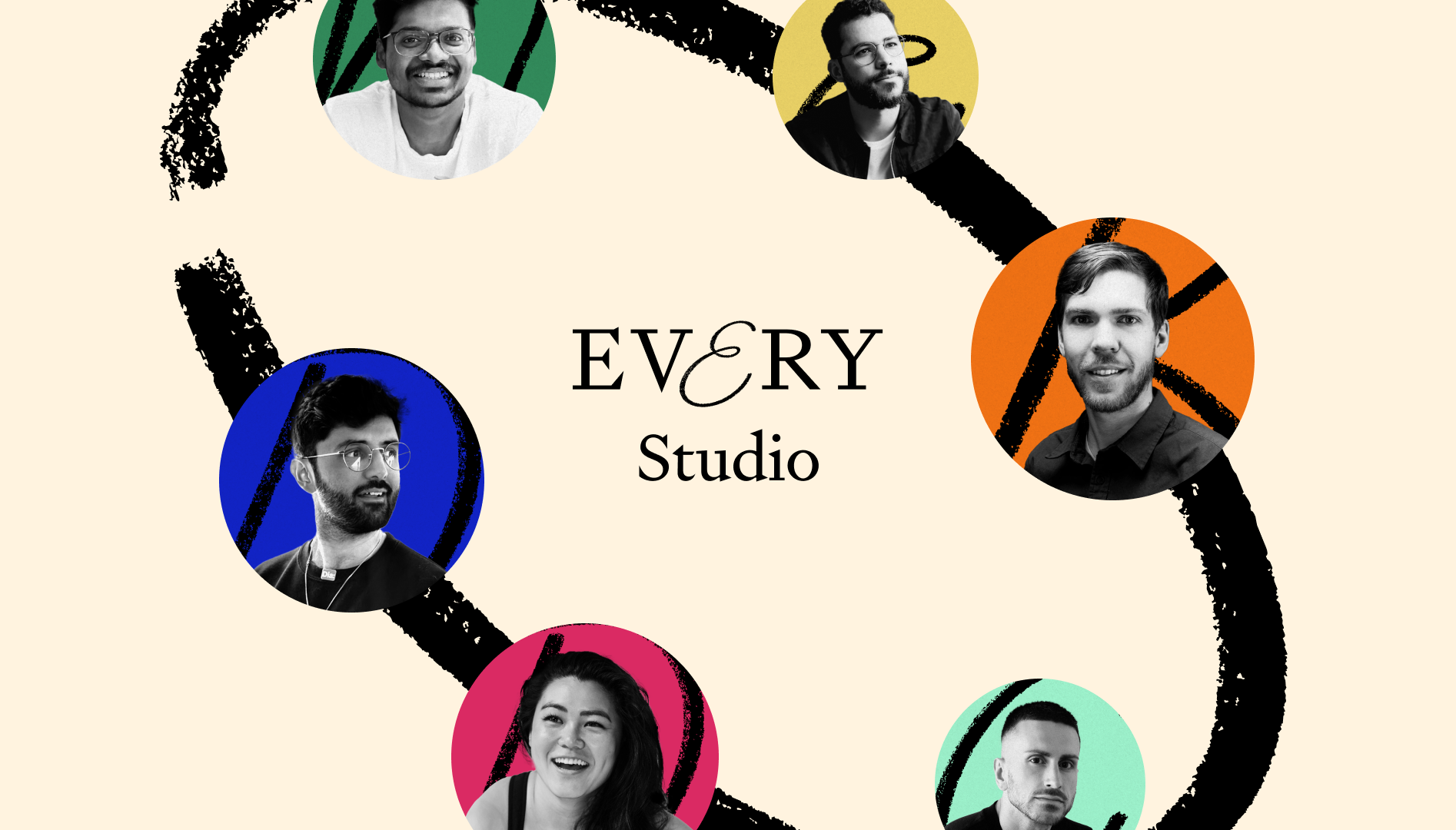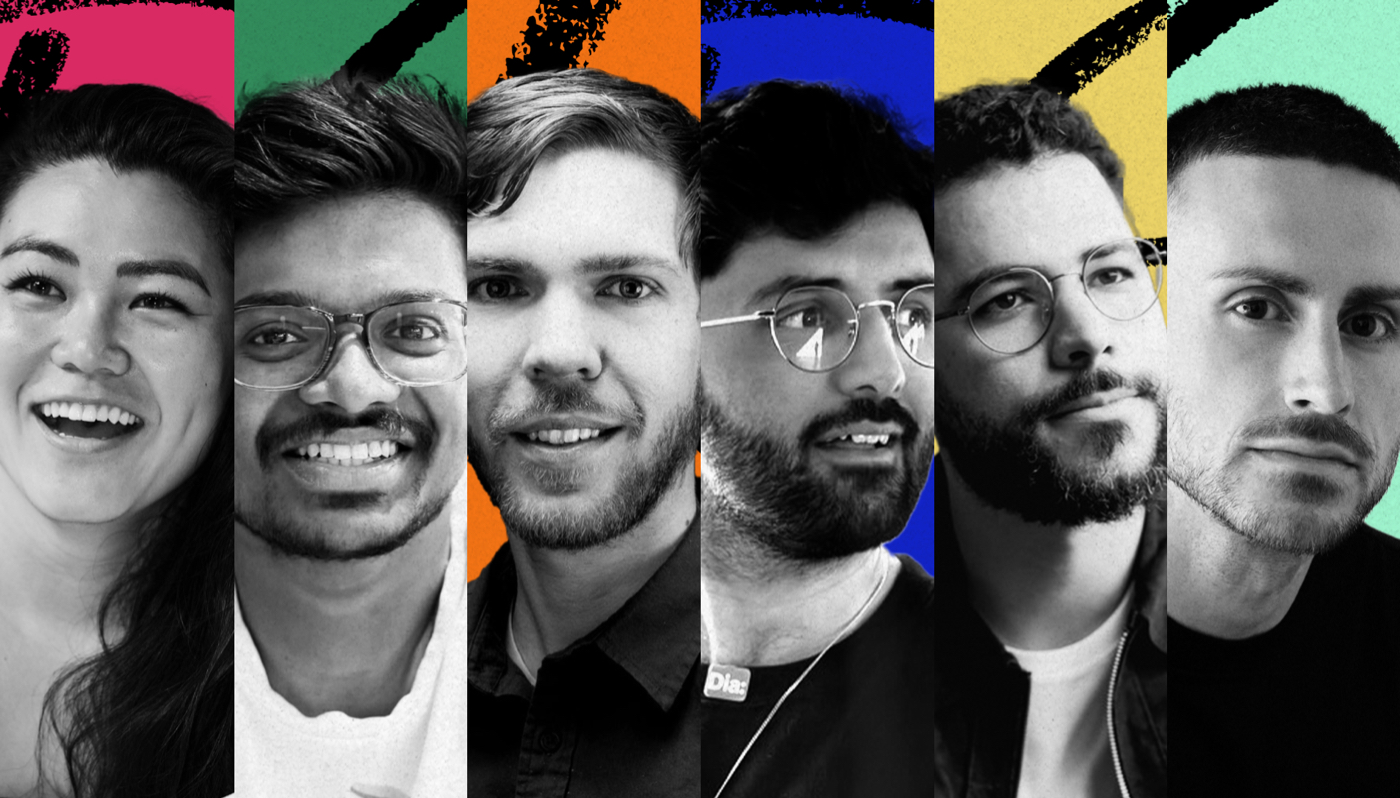
TLDR: Today, we’re officially announcing Every Studio, Every’s product incubation arm. Our first entrepreneur in residence (EIR) Brandon Gell is becoming the head of the Studio, and we’re bringing on our first class of five EIRs to incubate new businesses. Danny Aziz has joined to become the general manager of one of our recent incubations, Spiral. We’re also announcing a “speed” round of $150,000 from Gumroad founder Sahil Lavingia. Sign up to be the first to try our products as an Every Early Adopter.
Today, we’re launching our product incubation arm, Every Studio. Every Studio’s mission is to develop a bundle of AI apps—creative tools to expand your mind and help you do your best work, all included in the Every subscription.
Incubating products isn’t new to us. Over the last two and a half years we’ve incubated Spiral, Sparkle, and Lex, which Every cofounder Nathan Baschez spun out into its own company. It’s been without a doubt the most fun period of the company, and it’s paid dividends: We have better ideas and write better articles when we’re building things than when we’re commentating from the sidelines.
Releasing products also connects us to a long tradition of writers who are builders. Consider the New York Times: It is the newspaper of record and also a digital bundle that includes everything from games to recipes to product reviews. Glossier started as a newsletter, and so did Bridgewater. Basecamp, Hey, Trello, and StackOverflow are all the products of writers who create great software.
Now we want to do more of this kind of thing. So we’re bringing on our first class of entrepreneurs in residence (EIRs): five extremely talented technical founders who are going to spend the next three months shipping new experiments to Every’s Early Adopters. They’ll be led by our first EIR, Brandon Gell, who’s becoming the head of the Studio, and over the coming weeks we’re going to give you an inside look into every part of our process from start to finish.
As a first peek behind the curtain, we wanted to tell you why. Why is a media company a uniquely good place to incubate businesses?
Simply put, we believe we’re entering an era of gritty startups, where rapid experimentation and distribution to a discrete audience is the most exciting way to build new businesses. It’s already working for us, so we want to double down—and bring you along for the ride.
Why we’re building a product studio
At Every, we try to answer the question “What comes next?” every day. We believe one of the best ways to find out what comes next is to try to build it. And because we’re writers, we can run experiments to build the future cheaply and easily.
Language models are radically bringing down the cost to produce a prototype of a product. What used to take months or years now takes hours or days. We know this first-hand: The first version of Spiral was built in two days. We regularly build apps for internal use in hours or minutes.
We’ve also spent years building up an audience of readers like you—people who love new technology and new businesses, and who want to try the things we make. For most companies, it is expensive to validate whether anyone wants to use an experimental product. For us, it’s our life’s blood. If you’re building a product inside of a media business, the cost of customer acquisition is negative.
Some of our most successful articles are based on prototypes that never became full products, but did teach us a lot about what the future might look like. Each experiment informs our perspective so that we can write better articles and reach new readers.
We think this low cost of experimentation—both to prototype and to reach an audience—is an incredible advantage to finding great new product ideas.
And now is one of the best times in history to be experimenting. We believe that language models will teach a generation of people how to use computers in entirely new ways, just like Excel did decades ago. This will create new jobs, new workflows, new needs, new problems, and new possibilities that will spawn new categories of software businesses.
We intend to help build them.
Writing is important not just because it makes experimenting cheap, but also because it connects us with exactly the kind of founder we want to work with.
How we decide what to build
We believe that the weekend warriors tinkering with chatbots and playing with Advanced Voice Mode are living in the white-hot center of a future that we will all exist in soon enough. We believe that the best way to build products in a world like this is not through “customer research.” It is, instead, to make ourselves at home in that white-hot center and build what we want to use.
Our EIRs are building products that they want to use themselves. They’re solving problems that they’ve encountered living in the future.
We’ll know if those products are good because we’ll want to use them, too. And if we like them, we think there’s a good chance that you’ll like them, too.
Can these businesses be venture-scale?
Probably the most annoying question a startup founder can hear is: “How does this get to venture-scale?”
It’s annoying not because it’s a bad question but because it’s an old one. It’s a relic of a spray-and-pray ZIRP strategy that allows megafund venture capitalists living on a guaranteed 2 percent to take a lottery ticket on a binary outcome otherwise known as your life.
It is a product of a basic assumption: that there is a relatively high cost, in both dollars and time, to build an early version of a product and see if customers like it.
That’s not true at Every.
In a world where you can build and launch a prototype in an afternoon, scale can be an afterthought. We’ve created a model with optionality at its core and where we can let an idea become its best expression, whatever that is: experiment, cash-flow business, or the next Apple. We don’t spend our time trying to backsolve a bar chart showing $50 million in ARR at the end of year five.
We let curiosity and imagination be our guide.
How are we funding this program?
Well, we’ve got a seven-figure media business. In a world where the cost of development is rapidly decreasing, that gets us pretty far.
We’ve also created what we’re calling a “speed” round. We needed a little extra money to fund our Studio effort, so we texted our friend, Gumroad founder Sahil Lavingia. We raised what would be a laughably small amount for a regular venture capital round—$150,000—but one that gives us exactly what we need to take our next step as a company.
We’re calling this a “speed” round, and raising small amounts of capital extremely quickly for specific experiments is a model that we’ll continue to explore as we build new incubations.
Who is joining the Studio?
Left to right: Dorothy Ren, Naveen Naidu, Kieran Klaassen, Danny Aziz, Edmar Ferreira, Cassius Kiani. Every illustration.In this new landscape of AI-driven product development, a new breed of founder is emerging. They are the tinkerers. The readers, writers, and artists. The curious neophiles. The multidimensional autodidacts. The rangy polymaths. The well-rounded citizens.
These are also the people who read Every—and they make up our first class of EIRs. We think it’s of critical importance for us to work with this type of builder, because we believe that who you are determines in large part what you decide to build.
New head of Studio:
Brandon Gell is becoming the head of the Studio. Brandon was previously the founder and CEO of insurance tech company Clyde, which he ran for seven years. He’s raised more than $50 million and scaled his team to more than 100 people. He’s written about why he joined Every as our first entrepreneur in residence and cares deeply about Every’s mission to make a creative playground for builders.
New entrepreneurs in residences:
- Edmar Ferreira—Edmar is the founder of EverWrite, an AI SEO company and content marketing leader in Latin America. He is based in Brazil.
- Cassius Kiani—Cassias is the founder of the nonprofit Pledges and was previously the cofounder of Mora Medical.
- Kieran Klaassen—Kieran is a serial entrepreneur. He was previously the cofounder and vice president of engineering at marketplace platforms Vinebase and Occasion.
- Naveen Naidu—Naveen is the founder of software incubator Zeitalabs. Previously, he led engineering teams at ThreeSides in Japan.
New general manager of Spiral:
When we build incubations that work, we need to find talented founders to run them. Spiral has over 5,000 signups and a growing army of devoted fans. Now we’ve found the perfect person to take it to its next phase:
- Danny Aziz—Danny has led engineering teams at startups across the U.S. and Europe. Previously he was the founding engineer of workplace app General Collaboration.
New hacker in residence:
The most important part of incubating great products—and doing great writing—is fostering an environment teeming with talented people. In addition to EIRs, we’re bringing on hackers in residence: programmers who may not want to start a company, but who can collaborate with our EIRs and gain valuable experience leading some of our consulting projects.
- Dorothy Ren—Dorothy was previously a product manager at data platform Chord Commerce and an investor at NextView Ventures.
What does it mean to be an Every EIR?
The Every EIR program is a three-month partnership during which we work together to ship as many experiments as we can until we find product-market fit.
We meet three times a week for accountability and collaboration, and every Friday we have a show-and-tell where we demo what we shipped that week. When we find a promising idea, we launch it internally to the rest of Every. If our team likes it, we ship it to you, our readers.
Here’s what we offer EIRs during the program:
- Structure, advice, guidance, and ideas to identify a problem worth solving
- Accountability and community to build the best product
- End-to-end product and brand design
- Legal support and guidance
- Distribution, from launch to growth, and performance marketing
- Recruiting when ready, pulling from a bench of talented people who want to be involved in our projects
- Fundraising, if needed, with no BS and from great investors
- Consulting opportunities—we pair EIRs with consulting projects to help them make rent and discover new ideas along the way
What comes next?
Benjamin Franklin—writer, entrepreneur, and founding father—put it best when he said: “Either write things worth reading, or do things worth the writing.”
We aim to do just that in the coming months and years. We hope to inspire you to do the same.
If you’ve made it this far, you are obviously the kind of person we want to collaborate with. We’re creating a private community of Every readers who want to try our earliest experiments: our Early Adopters program.
If you want to be at the bleeding edge of everything we’re making, sign up to join:
Dan Shipper is the cofounder and CEO of Every, where he writes the Chain of Thought column and hosts the podcast AI & I. You can follow him on X at @danshipper and on LinkedIn.
Brandon Gell is the head of the Studio at Every. You can follow him on X at @bran_don_gell and on LinkedIn, and Every on X at @every and on LinkedIn.
The Only Subscription
You Need to
Stay at the
Edge of AI
The essential toolkit for those shaping the future
"This might be the best value you
can get from an AI subscription."
- Jay S.
Join 100,000+ leaders, builders, and innovators

Email address
Already have an account? Sign in
What is included in a subscription?
Daily insights from AI pioneers + early access to powerful AI tools







.png)

.png)
Comments
Don't have an account? Sign up!
Congratulations, Dan and team. I see one woman and a bunch of beards on very young men. Is that the culture of What Comes Next?